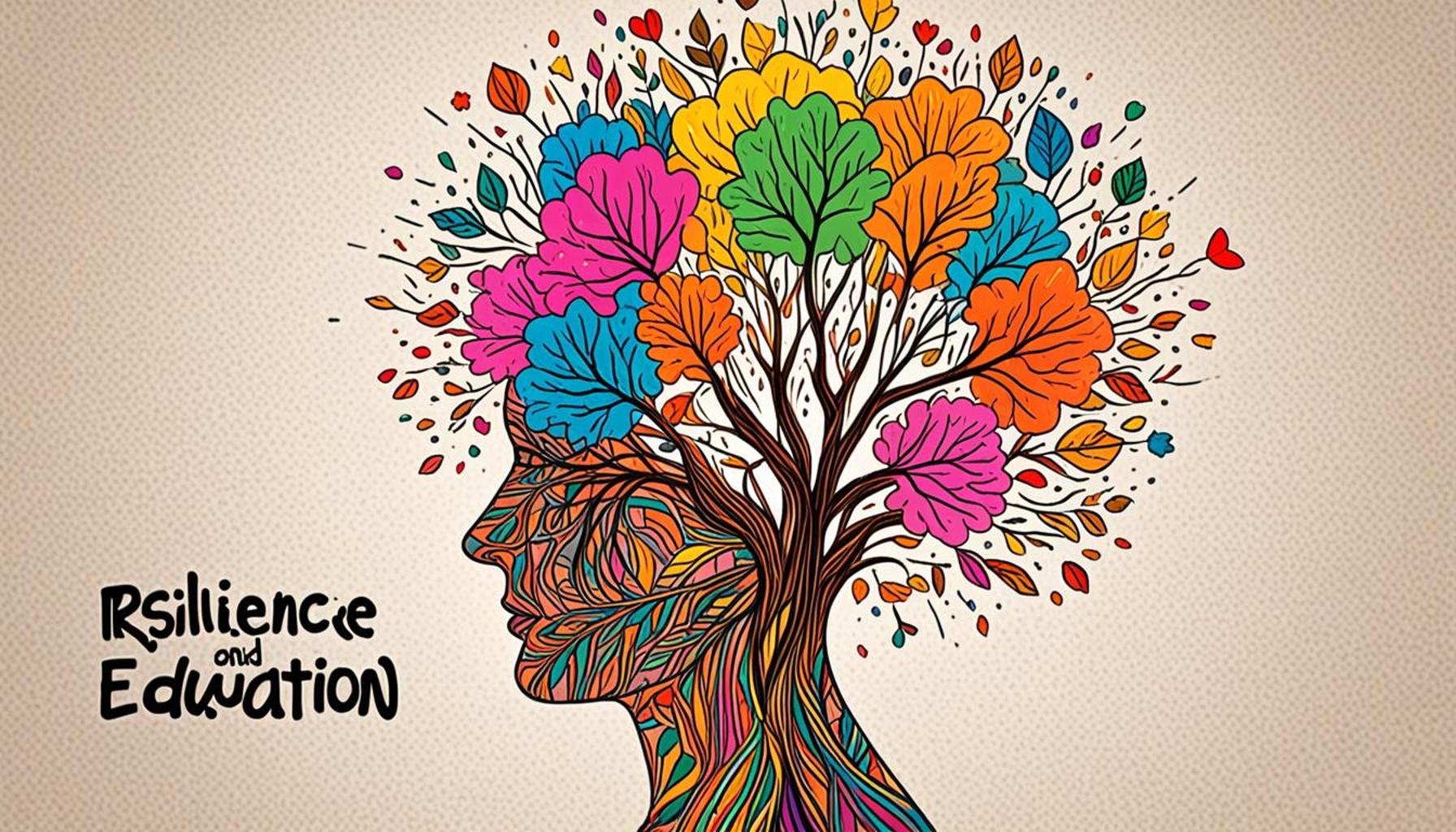Developing Resilience in Youth: Growth Mindset Strategies for the Future

The Journey of Resilience
The path of youth is often fraught with obstacles that can seem insurmountable, particularly in a country like Nigeria, where economic volatility and social challenges are part of the everyday experience. Developing a growth mindset is essential for young Nigerians facing these uncertainties. Emphasizing the importance of resilience can empower them to meet life’s challenges with confidence and determination.
Resilience is not merely surviving adversity; it involves thriving in the face of it. For young individuals, this translates to a deeper understanding that setbacks are not the end but stepping stones toward a brighter future. One essential aspect is fostering a positive attitude. For example, rather than viewing failure in an examination as a dead end, students could be encouraged to see it as a chance to identify gaps in their knowledge and improve. Schools and communities can implement programs that host forums to discuss the benefits of perseverance, where real stories of local success are shared to inspire the youth.
- Encouraging a positive attitude: Engaging youth in open discussions about the importance of perseverance can help reshape their outlook on challenges.
- Modeling adaptability: When parents and mentors demonstrate flexible thinking in the face of obstacles, it teaches the younger generation to do the same.
- Promoting problem-solving skills: Involving youth in community projects enables them to tackle real-world problems, enhancing their ability to approach their challenges creatively.
The necessity of these strategies goes beyond personal development. In a nation where unemployment rates are alarmingly high, fostering resilience can play a pivotal role in supporting not only individual youths but also the fabric of society itself. By equipping young people with the tools to face challenges, they become agents of change in their communities. Resilient individuals are more likely to start businesses, pursue higher education, and contribute to community development, ultimately leading to a stronger society.
Exploring effective strategies for nurturing resilience in the youth opens a window into how a growth mindset can transform perspectives on challenges. Communities across Nigeria are beginning to understand that investing in the resilience of their youth is imperative for building a sustainable future. As this movement gains momentum, it offers hope not only for the individuals involved but also for the collective prosperity of the nation.
YOU MAY ALSO LIKE: Read read another article
Strategies to Cultivate Resilience
As the landscape of modern Nigeria presents its unique set of challenges, it becomes crucial to equip the youth with the tools necessary for navigating adversity. Developing resilience is essential not just for personal fulfillment but also for the collective progress of society. One transformative approach is the incorporation of a growth mindset, which emphasizes the belief that abilities and intelligence can be developed through dedication and hard work. This mindset fosters resilience by teaching youth to view obstacles as opportunities for growth, rather than insurmountable walls.
To effectively instill this mindset in young individuals, several strategies have emerged as pivotal:
- Promoting Self-Reflection: Encouraging youth to engage in self-reflection after facing setbacks helps them analyze their experiences critically. This not only enables them to identify what went wrong but also empowers them to devise strategies for improvement. Simple journaling or guided discussion sessions can serve as effective platforms for this introspection.
- Celebrating Efforts, Not Just Outcomes: In Nigerian culture, achievement is often tightly linked to outcome. By shifting the focus to the process—highlighting effort, strategy, and improvement—youth can develop a healthier relationship with success and failure. Educational institutions can host award ceremonies recognizing effort and perseverance, thereby reinforcing the value of ongoing growth.
- Building a Supportive Community: Resilience thrives in environments that encourage collaboration and support. Creating peer mentoring systems within schools or community organizations can foster relationships where youth can share experiences and strategies for overcoming challenges, building a sense of belonging and mutual encouragement.
- Engaging in Goal-Setting: Teaching young people the importance of setting specific, measurable, achievable, relevant, and time-bound (SMART) goals can significantly enhance their sense of agency. This strategic approach helps them navigate challenges systematically and see progress over time, reinforcing their belief in their potential for growth.
The ripple effect of implementing these strategies is profound. As young people develop resilience, they grow into individuals who are not only better equipped to handle personal challenges but also more capable of contributing positively to their communities. In a nation overwhelmed by economic and social issues, resilient youth hold the key to innovation, entrepreneurship, and leadership, thus fostering a spirit of endurance that can propel Nigeria forward.
Moreover, the integration of resilience-building practices into educational systems, family dynamics, and community initiatives stands to create a robust framework that nurtures future generations. By making resilience and a growth mindset foundational values, Nigeria can cultivate a population that not only survives but thrives amid challenges, shaping a promising future for the nation.
| Advantage | Description |
|---|---|
| Enhanced Problem-Solving Skills | Encouraging a growth mindset fosters creativity in youth, enabling them to approach challenges with a positive view. |
| Increased Self-Efficacy | Youth learn to embrace setbacks, enhancing their belief in personal capabilities, which is crucial for future success. |
As we delve deeper into the topic of Developing Resilience in Youth, it becomes evident that embracing a growth mindset is not merely an educational strategy but a vital tool that carves pathways for personal development. The interaction of problem-solving skills and increased self-efficacy creates a foundation for resilience that young individuals carry into adulthood. Picture a scenario where conflict arises—youth armed with strong problem-solving skills are equipped not just to endure difficulties, but to navigate them cleverly.Moreover, as youth transition through various stages of life, their self-efficacy grows alongside their experiences. This cultivation of confidence in their abilities reinforces the idea that they can overcome obstacles and meet their goals. Herein lies the core of resilience: it thrives on the understanding that failure is not an end, but rather a stepping stone toward success. Such insights are crucial as we explore strategies and interventions that parents, educators, and mentors can foster to imbue these qualities in today’s youth. By creating environments conducive to these teachings, we hold the key to nurturing a generation adept not only in academic knowledge but also in life skills that forge stronger futures.
ADDITIONAL INSIGHTS: Expand your understanding here
The Role of Educators in Fostering Resilience
Educators are at the forefront of transforming how resilience is perceived and cultivated in today’s youth. As Nigeria grapples with various social and economic challenges, the integration of resilience training into educational curricula is more vital than ever. Teachers have a unique position to influence students’ perspectives on failure and success, making them key players in promoting a growth mindset.
One effective tactic is to integrate lessons on resilience directly into the curriculum. Subjects such as literature and history provide rich narratives that showcase the human spirit’s ability to overcome adversity. By analyzing characters or historical figures who exemplify resilience, students can learn to relate these qualities back to their own lives. For instance, discussing the journey of figures like Nelson Mandela or local heroes who transformed their communities can inspire learners to embrace challenges as essential steps towards success.
Furthermore, teachers should model a growth mindset through their interactions with students. When students observe educators addressing their own failures with a positive attitude—viewing them as learning opportunities—they are likely to adopt similar perspectives. Regular practice of sharing personal challenges and the lessons learned from them fosters an environment where students feel safe to take risks without the fear of judgment.
Community Involvement and Parental Engagement
The role of community involvement and parental engagement cannot be underestimated in building resilience. Communities in Nigeria can foster resilience by organizing workshops, seminars, and community service initiatives focused on growth mindset principles. Collaborating with local organizations can provide young people with opportunities to participate in projects that require problem-solving and adaptability, thus honing their resilience skills.
Parents, too, play a critical role in this process. By encouraging a dialogue at home that emphasizes effort and the learning process rather than just results, parents can help their children develop a growth mindset. For example, instead of merely praising a child’s performance on an exam, parents can acknowledge the hard work that led to that performance. This reinforcement not only nurtures resilience but also builds a deeper connection between parents and their children, laying a supportive foundation for further growth.
Leveraging Technology for Growth Mindset Development
In an increasingly digital world, leveraging technology can also facilitate resilience-building. Numerous applications and online resources are specifically designed to promote mindfulness, self-improvement, and goal-setting among young users. These tools can guide youth in tracking their progress and maintaining motivation, thereby fostering a growth mindset. Additionally, social media can be a platform for sharing stories of perseverance and success, allowing young people to connect with one another and draw inspiration from their peers.
Programs focusing on skills such as emotional intelligence and stress management, often available through online platforms, can also equip youth with tools to cope effectively with challenges. For instance, apps that offer guided meditations can help reduce anxiety, thereby expanding a young person’s capacity for resilience in stressful situations.
As Nigeria looks to future generations for innovative solutions to its challenges, the synergy between educators, parents, and communities in fostering resilience is paramount. By enhancing the youth’s ability to adapt and thrive, the nation can harness the potential of its younger population, transforming challenges into opportunities that ultimately lead to national progress.
CHECK OUT: Click here to explore more
Conclusion
In the ever-evolving landscape of Nigeria, where socio-economic turbulence is a common reality, the importance of developing resilience in youth cannot be overstated. The combined efforts of educators, parents, and the broader community play a pivotal role in instilling a growth mindset—a transformative approach that encourages young people to view obstacles as pathways to success. By actively engaging in resilience training, whether through curriculum integration or community programs, all stakeholders can create environments where youth feel empowered to embrace challenges rather than shy away from them.
Technology also presents unprecedented opportunities to facilitate resilience-building adventures for the youth. The proliferation of digital platforms dedicated to emotional intelligence and stress management equips young users with essential tools to navigate life’s adversities effectively. By utilizing these resources, Nigerian youth can engage in self-improvement narratives that promote growth and adaptability in the face of life’s uncertainties.
Ultimately, the goal of fostering resilience through a growth mindset is not merely to prepare today’s youth for academic or professional achievements but to cultivate compassionate, adaptable citizens who will contribute positively to their communities and the nation. As Nigeria looks towards the future, investing in the resilience of its youth will undoubtedly yield a generation ready to confront challenges head-on, fostering innovation and driving societal progress. The journey may be complex, but the collective commitment to this cause can catalyze a powerful shift toward a more resilient, empowered future.



